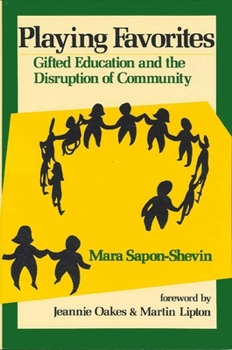Playing Favorites: Gifted Education and the Disruption of Community
Select Format
Select Condition 
Book Overview
Playing Favorites examines the ways in which gifted education disrupts the classroom community, deskills regular classroom teachers, limits their ability and willingness to meet individual needs, and impairs the creation of a climate of inclusion and acceptance of difference. Sapon-Shevin shows here that current models of gifted education are elitist and meritocratic, treating some children, not just differently than others, but better; and that in...
Format:Paperback
Language:English
ISBN:0791419800
ISBN13:9780791419809
Release Date:April 1994
Publisher:State University of New York Press
Length:275 Pages
Weight:1.05 lbs.
Dimensions:0.8" x 6.2" x 9.1"
Customer Reviews
2 ratings
Quality book with many truths...
Published by Thriftbooks.com User , 24 years ago
As a parent of a gifted child I've seen a number of similarities between my child's education and what was described in the Book. Although I don't agree with everything the author had to say, she eloquently outlines some undeniable problems with gifted programs. Every parent who is concerned about their child's education should read this book.
An outstanding, much-needed book
Published by Thriftbooks.com User , 25 years ago
I became interested in "gifted children" after reading Ellen Winner's book "Gifted Children: Myths and Realities". After skimming through several books on "gifted children," I was very much disturbed by what I saw. "Giftedness," it seemed, was defined differently by each author. Winner says "gifted children" are precocious, have a rage to master, and march to their own drummer. Other authors define "gifted children" as having high IQs, or getting good grades, or being creative "divergent thinkers", or according to the federal definition (children who have outstanding abilities and are capable of high performance in a number of different areas). None of these definitions is consistent! Ms. Sapon-Shevin explodes the myth that "giftedness" is an objective reality. Rather, it is a "social construct," in the eye of each beholder. Sapon-Shevin does not deny that there are differences in the rate at which children learn. She does question the importance of IQ testing, the naive statement that the gifted are "our future leaders," and the conceptualization of "gifted children" as unique and not at all like "non-gifted" or "ungifted" children. She observes a gifted program and presents the difficulties in implementation as well as the confusion on the part of parents, teachers, and children regarding who is really gifted. Finally, Sapon-Shevin presents a model for a truly inclusive school community that serves the needs of all children.




